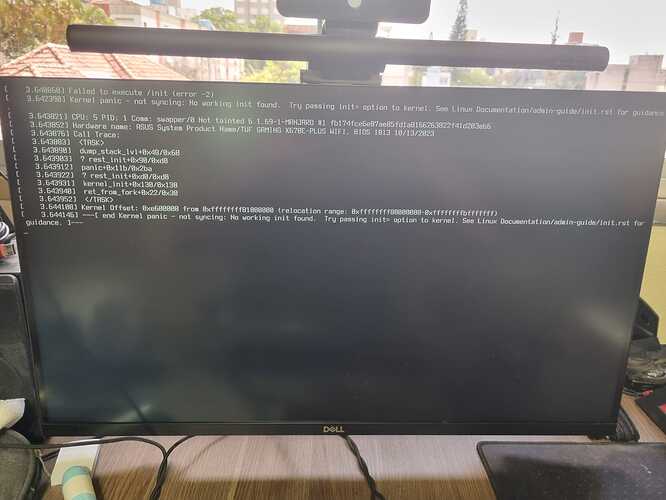Booting with the isos did work on both free and non free drivers. I believe I might have a dangling uefi partition/configuration:
efibootmgr -v ✔
BootCurrent: 0001
Timeout: 1 seconds
BootOrder: 0001,0000,0002,0003,0004,0005,0006
Boot0000* Windows Boot Manager HD(2,GPT,9c40cb23-a5f7-4674-b9fc-3d5a02e41278,0x1ddc60,0x5e0c4)/File(\EFI\Microsoft\Boot\bootmgfw.efi)57494e444f5753000100000088000000780000004200430044004f0042004a004500430054003d007b00390064006500610038003600320063002d0035006300640064002d0034006500370030002d0061006300630031002d006600330032006200330034003400640034003700390035007d00000064000100000010000000040000007fff0400
dp: 04 01 2a 00 02 00 00 00 60 dc 1d 00 00 00 00 00 c4 e0 05 00 00 00 00 00 23 cb 40 9c f7 a5 74 46 b9 fc 3d 5a 02 e4 12 78 02 02 / 04 04 46 00 5c 00 45 00 46 00 49 00 5c 00 4d 00 69 00 63 00 72 00 6f 00 73 00 6f 00 66 00 74 00 5c 00 42 00 6f 00 6f 00 74 00 5c 00 62 00 6f 00 6f 00 74 00 6d 00 67 00 66 00 77 00 2e 00 65 00 66 00 69 00 00 00 / 7f ff 04 00
data: 57 49 4e 44 4f 57 53 00 01 00 00 00 88 00 00 00 78 00 00 00 42 00 43 00 44 00 4f 00 42 00 4a 00 45 00 43 00 54 00 3d 00 7b 00 39 00 64 00 65 00 61 00 38 00 36 00 32 00 63 00 2d 00 35 00 63 00 64 00 64 00 2d 00 34 00 65 00 37 00 30 00 2d 00 61 00 63 00 63 00 31 00 2d 00 66 00 33 00 32 00 62 00 33 00 34 00 34 00 64 00 34 00 37 00 39 00 35 00 7d 00 00 00 64 00 01 00 00 00 10 00 00 00 04 00 00 00 7f ff 04 00
Boot0001* manjaro HD(2,GPT,9c40cb23-a5f7-4674-b9fc-3d5a02e41278,0x1ddc60,0x5e0c4)/File(\EFI\manjaro\grubx64.efi)
dp: 04 01 2a 00 02 00 00 00 60 dc 1d 00 00 00 00 00 c4 e0 05 00 00 00 00 00 23 cb 40 9c f7 a5 74 46 b9 fc 3d 5a 02 e4 12 78 02 02 / 04 04 36 00 5c 00 45 00 46 00 49 00 5c 00 6d 00 61 00 6e 00 6a 00 61 00 72 00 6f 00 5c 00 67 00 72 00 75 00 62 00 78 00 36 00 34 00 2e 00 65 00 66 00 69 00 00 00 / 7f ff 04 00
Boot0002* ubuntu HD(2,GPT,9c40cb23-a5f7-4674-b9fc-3d5a02e41278,0x1ddc60,0x5e0c4)/File(\EFI\ubuntu\shimx64.efi) File(.)
dp: 04 01 2a 00 02 00 00 00 60 dc 1d 00 00 00 00 00 c4 e0 05 00 00 00 00 00 23 cb 40 9c f7 a5 74 46 b9 fc 3d 5a 02 e4 12 78 02 02 / 04 04 34 00 5c 00 45 00 46 00 49 00 5c 00 75 00 62 00 75 00 6e 00 74 00 75 00 5c 00 73 00 68 00 69 00 6d 00 78 00 36 00 34 00 2e 00 65 00 66 00 69 00 00 00 / 7f ff 04 00
data: 00 00 42 4f
Boot0003* UEFI: KingstonDataTraveler 3.0 PciRoot(0x0)/Pci(0x2,0x1)/Pci(0x0,0x0)/Pci(0xc,0x0)/Pci(0x0,0x0)/USB(2,0)/CDROM(1,0x7482bc,0x8000)0000424f
dp: 02 01 0c 00 d0 41 03 0a 00 00 00 00 / 01 01 06 00 01 02 / 01 01 06 00 00 00 / 01 01 06 00 00 0c / 01 01 06 00 00 00 / 03 05 06 00 02 00 / 04 02 18 00 01 00 00 00 bc 82 74 00 00 00 00 00 00 80 00 00 00 00 00 00 / 7f ff 04 00
data: 00 00 42 4f
Boot0004* UEFI:CD/DVD Drive BBS(129,,0x0)
dp: 05 01 09 00 81 00 00 00 00 / 7f ff 04 00
Boot0005* UEFI:Removable Device BBS(130,,0x0)
dp: 05 01 09 00 82 00 00 00 00 / 7f ff 04 00
Boot0006* UEFI:Network Device BBS(131,,0x0)
dp: 05 01 09 00 83 00 00 00 00 / 7f ff 04 00
So I removed the ubuntu entry:
(base) vfbsilva@isengard ~ $ sudo efibootmgr -b 0002 -B 0002
[sudo] senha para vfbsilva:
BootCurrent: 0001
Timeout: 1 seconds
BootOrder: 0001,0000,0003,0004,0005,0006
Boot0000* Windows Boot Manager HD(2,GPT,9c40cb23-a5f7-4674-b9fc-3d5a02e41278,0x1ddc60,0x5e0c4)/File(\EFI\Microsoft\Boot\bootmgfw.efi)57494e444f5753000100000088000000780000004200430044004f0042004a004500430054003d007b00390064006500610038003600320063002d0035006300640064002d0034006500370030002d0061006300630031002d006600330032006200330034003400640034003700390035007d00000064000100000010000000040000007fff0400
Boot0001* manjaro HD(2,GPT,9c40cb23-a5f7-4674-b9fc-3d5a02e41278,0x1ddc60,0x5e0c4)/File(\EFI\manjaro\grubx64.efi)
Boot0003* UEFI: KingstonDataTraveler 3.0 PciRoot(0x0)/Pci(0x2,0x1)/Pci(0x0,0x0)/Pci(0xc,0x0)/Pci(0x0,0x0)/USB(2,0)/CDROM(1,0x7482bc,0x8000)0000424f
Boot0004* UEFI:CD/DVD Drive BBS(129,,0x0)
Boot0005* UEFI:Removable Device BBS(130,,0x0)
Boot0006* UEFI:Network Device BBS(131,,0x0)
But it comes back after a reboot.
